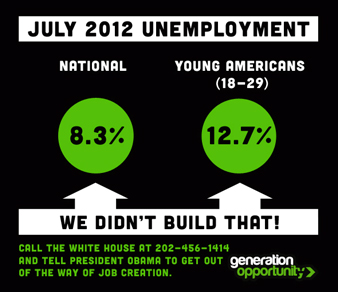By Saeed Shabazz -Staff Writer-

NEW YORK (FinalCall.com) – Youth unemployment has reached 11.7 percent nationally, according to the U.S. Dept. of Labor, however, for Black youth, ages 19 to 29 the national number is 20 percent, while 12.6 percent of Latinos in the same age bracket are unemployed.
“Young people are finding fewer opportunities and are being saddled with the costs of our country’s unsustainable deficits. After years of deficit spending and government meddling in the economy, one in six of America’s youth don’t have a job,” Evan Feinberg, president of Generation Opportunity, a Washington, D.C.-based youth advocacy organization stated in a press release.
“These are not just numbers, there’s a real human impact behind these numbers which is troublesome,” Terence Grado, the organization’s director of national and state policy explained to The Final Call.
Mr. Grado said even more troubling is the fact that 1.7 million youth in the 19-29 bracket have given up looking for work; a number he considered abnormally high. “Seems that a lack of jobs for young people has become the new normal,” he added.
On Staten Island, a young Black man, who would only give his first name, Tommy, 30, told The Final Call he had been looking for work for over a year after losing his minimum wage job. Tommy said he graduated from high school in 2000, with dreams of becoming a musical engineer.
“When you are 24-25 years old, you don’t realize how serious life can be,” Tommy admitted. He now has a family that includes a one-year-four-month old daughter. I can’t support my family on a minimum wage job; so I have to get some type of education, he said.

Sequan Morgan, 20, graduated from high school with honors and now attends the College of Staten Island. “Hard for a lot of youth my age to find work, and when they do, the pay is minimum wage or a part-time job,” Mr. Morgan told The Final Call. He said the bar has been raised even for low-paying jobs, with many of them requiring an Associate Degree.
Mr. Morgan also noted that many of his peers are up against stiff competition for jobs, because with older people being laid off, they get the available jobs.
A recent PEW study stated that 49 percent of those interviewed say they have taken a job they didn’t want just to pay the bills, with 24 percent saying they have taken an unpaid job to gain work experience. One in four (24 percent) say they have moved back in with their parents after living on their own.
Mr. Morgan admits that he lives with his grandparents.
Michele Holder, an Economist and Senior Policy Analyst for the NYC-based organization Community Service Society that serves as a voice for over three million low-income New Yorkers, explained to The Final Call that there are an estimated 170,000 to 200,000 young adults in NYC who are not in school; nor in the work force.
One of the solutions that CSS believes would be helpful is the restoring of funds, at the level before the recession, to the State Youth Employment Program, according to Ms. Hodges. The Federation of Protestant Welfare Agencies reports that SYEP was allocated $43 million in city, state and federal funds for 29,300 jobs for 2012, a loss of 5,097 jobs from 2011.
The NYC Dept. of Youth and Community Development on its website notes that the funding level for 2013 is contingent on legislative budget actions, therefore, the funding level is still not known. Calls to the department have not been returned.
Ms. Hodges said the SYEP jobs are important, because “several studies show” that it is important for young people “to get an early start in the market place.”
She also said that CSS has been in discussions with the NYC Transit Workers Union concerning apprenticeship programs in maintenance and repair jobs.
According to the NYSDOL, youth unemployment is 9.2 percent overall in NYC, with The Bronx at 12.5 percent for Black youth. However, some activists argue the real figure in some zip codes is 35 percent. Staten Island with a median household income from $66,292 to $81,000, unemployment for Black youth is 12.1 percent; for Latinos, 8.9 percent.
In Chicago, Philip Jackson of The Black Star Project tells The Final Call that “Black people cannot wait for the DOL to provide jobs for our youth.”
“Unofficially, some academics believe that only 14 out of 100 young Black men have jobs,” Mr. Jackson said, adding, “We are calling on the ‘Faith-Based’ community to sign onto our “1 Church, 1 Job, 1 Young Black Man Working” initiative.”
Here’s how it would work: During the summer for five or six weeks take up a special collection of $200 a week; hire a young man to work in the church, temple, synagogue or mosque for 20-hours a week; ensure each young man gains valuable work experience; ensure that each young man receives valuable mentoring experience.
Brian Dunn, chairman of the Board of Trustees at Chicago’s New Canaan Community Church tells The Final Call his church “didn’t have to think twice” about what Black Star was proposing. “A phenomenal idea!” he said.
“This is a major step for youth development — gives them an edge on how to deal with people in the marketplace,” Mr. Dunn said. New Canaan employs two young men who perform maintenance duties; and one young lady who helps with administrative duties.
Ms. Hodges of CSS said the Black star Project idea “sounds good to me.” Churches play a large role in the Black and Latino communities, which means our own institutions would pick up the slack, she offered.
Mr. Grado of Generation Opportunities also wants the private sector to step up to the plate. “We have to inspire the private sector, where seven out of eight jobs are available — that our young people have the necessary skills,” he said.
Johnny, 21, also of Staten Island was about to enter the Education Continuum Program where he has an internship.” It’s about motivation and dedication,” he told The Final Call. He said he was raised by a single-mother who told him to learn from the mistakes of others.
“There’s a time and place when you have to get serious about your life–even as difficult as it can be,” he said. Go back to school, get a five-year plan–stop dreaming of the fast life.”












